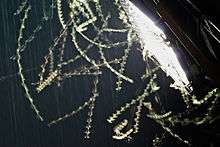Rod (optics)

"Rods" (sometimes known as "skyfish", "air rods", or "solar entities") is a term used in cryptozoology, ufology, and outdoor photography to refer to elongated artifacts in the form of light-rods produced by cameras. Videos of rod-shaped objects moving quickly through the air were claimed by some ufologists and cryptozoologists to be alien life forms, "extradimensional" creatures, or very small UFOs. Subsequent experiments showed that these rods appear in film because of an optical illusion/collusion (especially in interlaced video recording),[1] and are typically traces of a flying insect's wingbeats.[2]
Optical analysis
The Straight Dope columnist Cecil Adams called rods a hoax "where unscrupulous people are exploiting a gullible public for profit", and said that investigators have shown that rods are mere tricks of light which result from how images (primarily video images) of flying insects are recorded and played back. In particular, the fast passage before the camera of an insect flapping its wings has been shown to produce rodlike effects, due to motion blur, if the camera is shooting with relatively long exposure times.[3]
After attending a lecture by Escamilla, UFO investigator Robert Sheaffer wrote that "some of his “rods” were obviously insects zipping across the field at a high angular rate" and others appeared to be “appendages” which were birds' wings blurred by the camera exposure.[4]
Cryptozoology
Various paranormal interpretations appeared in the popular culture, and one of the more outspoken proponents of rods as alien life forms is Jose Escamilla, who claims to have been the first to film them on March 19, 1994 at Roswell, New Mexico, while attempting to film a UFO. Since then, Escamilla has made additional videos and embarked on lecture tours to promote his claims.[2]
In August 2005, China Central Television (CCTV) aired a two-part documentary about flying rods in China. It reported the events from May to June of the same year at Tonghua Zhenguo Pharmaceutical Company in Tonghua City, Jilin Province, which debunked the flying rods. Surveillance cameras in the facility's compound captured video footage of flying rods identical to those shown in Jose Escamilla's video. Getting no satisfactory answer to the phenomenon, curious scientists at the facility decided that they would try to solve the mystery by attempting to catch these airborne creatures. Huge nets were set up and the same surveillance cameras then captured images of rods flying into the trap. When the nets were inspected, the "rods" were no more than regular moths and other ordinary flying insects. Subsequent investigations proved that the appearance of flying rods on video was an optical illusion created by the slower recording speed of the camera.[1]
In 2012, the Malaysian independent newspaper Daily Express reported that a British traveller named Matthew Lazenby had "discovered" rods in a cave in Sabah. Lazenby described the "flying rods" as insect-like creatures unlike any known animal, and announced his intention to capture a specimen.[5]
See also
References
- 1 2 中国UFO悬案调查:飞棍出没的世界(下) SINA Technology News, "China's outstanding UFO Investigation: fly rod Haunted World (Part Two)"
- 1 2 Carroll, Robert Todd (2003). "A Collection of Strange Beliefs, Amusing Deceptions, and Dangerous Delusions". John Wiley & Sons. Retrieved 6 April 2010.
- ↑ Adams, Cecil (September 18, 2000). "What's up with "rods," the mysterious insects that can be seen only on video?". The Straight Dope. Retrieved 6 April 2010.
- ↑ Sheaffer, Robert (March–April 2000). "ET, You've Got Mail". Skeptical Inquirer. Committee for Skeptical Inquiry. Retrieved 6 April 2010.
- ↑ "'Flying Rods' discovered in Sabah". Daily Express. 20 December 2012. Retrieved 23 December 2012.
External links
- Jose Escamilla's "Rods" Video Sequences
- Rods: Flying Absurdities - Do these invisible flying creatures really exist? Skeptoid: Critical Analysis of Pop Phenomena
- Famous video of "rods" at the Cave of the Swallows
- Detailed video analysis